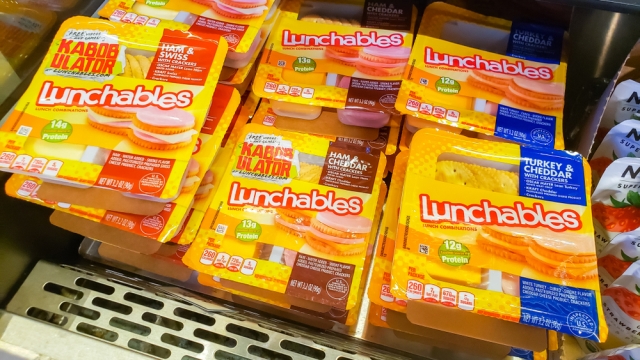Consumer Reports has launched a petition to the U.S. Department of Agriculture to remove Lunchables from the list of allowable school lunches after testing products for levels of lead, sodium and other chemicals.
The petition followed a report that tested 12 varieties of store-bought prepackaged school lunches, like Lunchables, Armour LunchMakers and Oscar Mayer P3 Portable Protein Packs.
Kraft Heinz began making two varieties of Lunchables that meet federal school lunch requirements for K-8 students in 2023. Turkey and cheese Lunchables, as well as the extra cheesy pizza variety, are available to schools. These varieties differ from the ones available in stores, Kraft Heinz said at the time.
Consumer Reports said that consumption of lead and high levels of sodium in food could cause significant health problems.
"We urge you to remove Lunchables processed food kits from the National School Lunch Program and give our nation’s school children healthier food choices," the petition to the USDA reads. "New tests from Consumer Reports found that store-bought Lunchables and similar kits had relatively high amounts of lead, cadmium and sodium. And all but one kit (Lunchables Extra Cheesy Pizza) contained the plastic chemical phthalate, a known hormone disruptor that can contribute to an increased risk of reproductive problems, diabetes and certain cancers."
SEE MORE: Is the potato a vegetable? USDA says yes, and it will stay that way
Consumer Reports used California’s maximum allowable dose level to test for lead. Consumer Reports said five of the 12 tested products "would expose someone to 50% or more of California’s maximum allowable dose level."
The highest lead levels were found in Lunchables' Turkey and Cheddar Cracker Stackers, at 74% of the maximum allowable dose level. It is important to note that Consumer Reports tested the version sold in stores, and Kraft Heinz said it uses a different recipe for ones sold in schools.
It was followed by Lunchables' Pizza with Pepperoni variety, which had 73%.
“That’s a relatively high dose of heavy metals, given the small serving sizes of the products, which range from just 2 to 4 ounces,” Eric Boring, Consumer Reports' chemist who led the test, said in the report.
Both the store-bought turkey and cheese and pepperoni pizza Lunchables contained over 45% of the sodium recommended by the U.S. Dietary Guidelines for 4- to 8-year-olds.
Lunchables sold to schools have even higher sodium levels than the ones purchased in stores. For instance, store-bought turkey and cheese Lunchables have 740 milligrams of sodium, while ones in school have 930 milligrams.
The pepperoni pizza Lunchables have 510 milligrams of sodium in stores, but Lunchables made for schools have 700 milligrams.
Last summer, the USDA lowered the maximum sodium levels allowed in school lunches.
Lunches for K-5 students are now limited to an average of 1,110 milligrams of sodium per meal. The previous standard for younger students was 1,230 milligrams. The sodium limits for students in grades 6-8 went from 1,360 milligrams to 1,225 milligrams per day.
Scripps News has contacted Kraft Heinz for its reaction.
Trending stories at Scrippsnews.com





